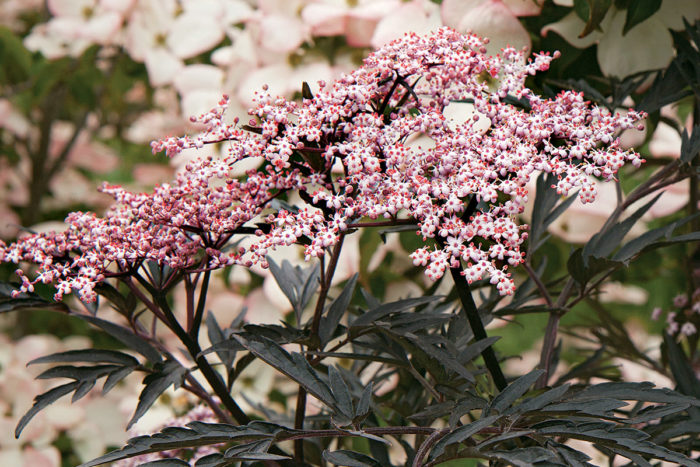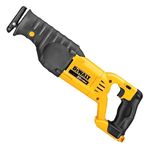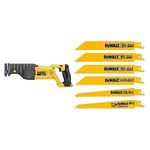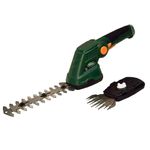
See regional picks for showy shrubs, and read the article by Paul Cappiello for even more ideas.
“Show-stopping shrubs—you know the kind. You’re leading a group of friends around the garden, and they’re politely following you with gin and tonic in hand, oooing and aaahing in slightly hushed tones. And then it happens. They spot something in the distance that throws the whole shebang into chaos. The formerly demure and proper garden folk are throwing sharp elbows as they vie for the best path to whatever it is that caught their collective eye. After all, they’ve got to be the first to Instagram the heck out of it.” Read more Show-Stopping Shrubs.
1. Yellow Bells

Tecoma stans
Zones: 7–11
Size: 6 to 20 feet tall and 5 to 15 feet wide (grows smaller in inland areas)
Conditions: Full sun; well-drained soil
Native Range: Southwestern United States, parts of Mexico and Central America
This is one of my favorite plants for a water-wise garden because, aside from its drought tolerance, it blooms prolifically and tolerates a wide range of soils and temperatures. Yellow bells can bloom for months at a time. Use it as a colorful backdrop, a focal point, massed in larger gardens, or planted to make a visual statement in a decorative container. There are some newly introduced cultivars sporting different blossom color combinations (blended hues of yellow, orange, and brick red) and also new dwarf varieties that stay only 3 to 4 feet tall, but the straight species is still a star.
2. Variegated Sky Flower

Duranta erecta ‘Variegata’
Zones: 8–10
Size: 15 to 25 feet tall and 8 to 12 feet wide
Conditions: Full sun to partial shade; lean, well-drained soil
Native Range: South America, Mexico, and the Caribbean
Although variegated sky flower can be grown as a small tree or a large shrub, it handles pruning well and is versatile enough to be kept much smaller—even as a trained espalier. Variegated foliage is edged and splashed with white, giving it a scintillating, airy effect. The tips of arching, supple stems explode in clusters of bright, blue-purple flowers followed by panicles of glowing golden berries. Birds and butterflies love it. Line up several plants to create a living wall, to fill a corner, or to cover an unsightly view. Or you can use the shrub as a solo performer surrounded by the ground cover of your choice.
3. Black Lace® Elderberry

Sambucus nigra ‘Eva’
Zones: 4–7
Size: 4 to 8 feet tall and wide
Conditions: Partial shade; moist, well-drained soil
Native Range: Europe, northern Africa, and southwestern Asia
If you love Japanese maples (Acer palmatum and cvs., Zones 5–8) but live in a place where dry air and desiccating winds make them struggle, try Black Lace® elderberry. Despite being considered good for cooler areas, this stunning shrub will handle the high temperatures of canyons and chaparral if given shade and plenty of water for the first year or two. This deciduous elderberry is clothed with finely cut, deep black-purple foliage topped with huge lacy platters of tiny pink flowers in late spring followed by black berries. It creates a lovely dark backdrop for nearly all flowering perennials, or you can simply let it contrast with other green foliage plants, where it will be a hard-to-miss focal point.
4. Purple Pixie® Dwarf Weeping Fringe Flower

Loropetalum chinense ‘Peack’
Zones: 7–10
Size: 1 foot tall and 4 to 5 feet wide
Conditions: Full sun to full shade; well-drained soil
Native Range: China, Japan, and Southeast Asia
Fringe flowers offer another way to paint all-season color into the garden with foliage. Purple Pixie® throws in fringed tassels of brilliant hot pink flowers that light up the deep burgundy-violet, evergreen leaves. With its low growth habit and gracefully arching stems, this variety suits a wide spectrum of landscape styles. Try it in matching containers for an entryway, or use it as an informal, mounding ground cover to frame taller, vertical-growing plants. Although on the coast it will tolerate full sun, inland this beauty needs to be sited in mostly shade.
Jane Gates is a landscape designer from Los Angeles.
Fine Gardening Recommended Products

DeWalt Variable-Speed Cordless Reciprocating Saw

DeWalt Variable-Speed Cordless Reciprocating Saw with 6-Piece Saw Blade Set

Scotts Cordless Grass-Shear/Shrub-Trimmer Combo


















Comments
Log in or create an account to post a comment.
Sign up Log in